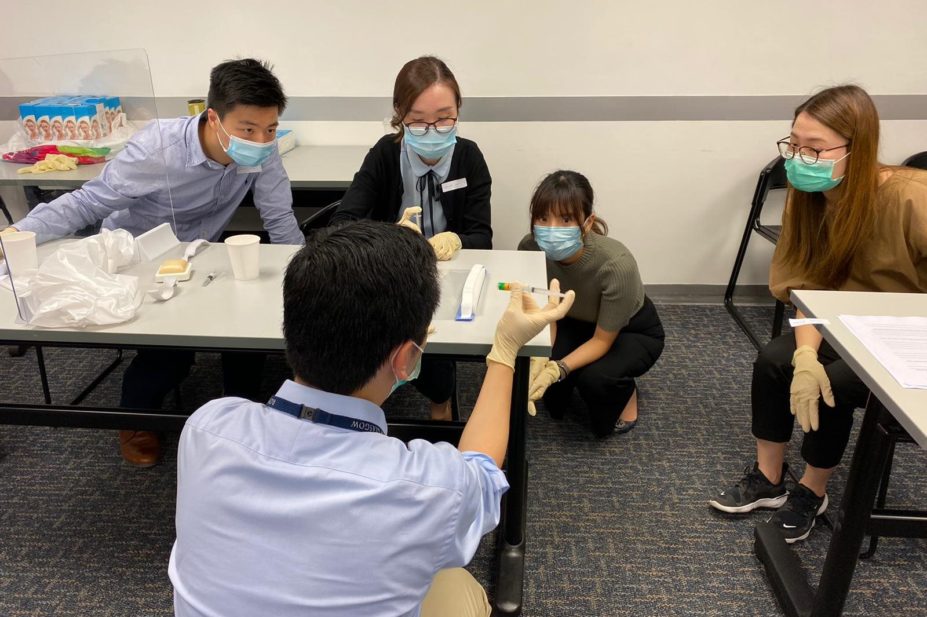
Mike Bereza
The challenge of administering COVID-19 vaccinations widely and quickly will be a global one. The pharmacy sector in the UK is already gearing up to provide COVID-19 vaccinations to at-risk patients. In the same way as the NHS, when a vaccine is ready, the healthcare system in Hong Kong will need all hands on deck to administer it to the public.
With a workforce of 14,290 doctors for a total population of 7.4 million, the Society for Hospital Pharmacists of Hong Kong (SHPHK) predicts that at least 7,000 extra medical staff will be needed to vaccinate 2.6 million people as part of the first phase of a COVID-19 vaccination programme.
But Hong Kong faces an additional hurdle. Pharmacists in China are not authorised to administer vaccines and had never done so prior to a training programme led by our UK-based provider, Voyager Medical.
We have been providing vaccination training to community pharmacists in the UK since 2015 but, in January 2019, my colleague Alex Leung, clinical lead at Voyager Medical, and pharmacist Dennis Fong accepted a call from the University of Hong Kong to bring their training overseas.
While training for some pharmacists in the UK moved online during 2020 because of the pandemic, we felt it was really important for Alex to physically go to Hong Kong to deliver the training hands-on. As is usually the case in the UK, when a pharmacist has their initial vaccination training, it takes place face to face as administering a vaccine is a physical process, so it’s helpful to have someone with you when you start.
Overall, the pharmacists there were very receptive to vaccination training and the first pharmacist-administered vaccination in Hong Kong occurred on 12 October 2020.
However, they are accustomed to being on the other side of the counter to the patient and having that distance, so there was some initial hesitation around losing that.
We faced bigger problems when it came to the regulations around when pharmacists can and cannot administer a vaccine.
Unlike the NHS, Hong Kong’s drug regulator, the Pharmacy and Poisons Board, doesn’t have an equivalent to patient group directions, which — in the UK — allow healthcare professionals to administer certain prescription-only medicines to defined groups of patients, without a prescription.
However, they do allow GPs to supervise pharmacists in delivering the vaccine. So, what we are looking into is having GPs conduct remote consultations, with the pharmacist then administering the vaccination. This would be facilitated using our HubNet.io online pharmacy information system, which will be necessary for pharmacist vaccinations to be an efficient use of the workforce. It’s not the exact same legal mechanism but we are trying to work with what we have.
So far, we have trained 100 pharmacists in Hong Kong, enabling them to administer flu vaccines to patients as part of a pilot that will last until the end of 2020.
The aim is to expand this to 800 pharmacists in 2021, but it’s quite difficult. The rate-limiting step being getting the government to understand that pharmacists vaccinating is not a new thing — it has been around internationally for nearly 20 years.
But looking at the capacity of vaccine administration in Hong Kong currently and then looking at the population size, it’s clear that without the help of community pharmacists, administering sufficient COVID-19 vaccines would be incredibly time consuming.
It’s strange to think that pharmacist vaccine administration still needs piloting. We’ve known in the UK and in the United States for a long time that we can do it pretty well. But there has always got to be that first patient.
We know that pharmacists are just as proficient at administering vaccines as GPs and we’re also on every high street. In Hong Kong, pharmacies are also everywhere. If we can get more accessible, we can save lives.
Mike Bereza, managing director, Voyager Medical
You may also be interested in
What are the views of the RPS and Pharmaceutical Press on AI training using copyrighted materials?

HIV patients should switch to long-acting antiretroviral injectable treatments sooner, study concludes
